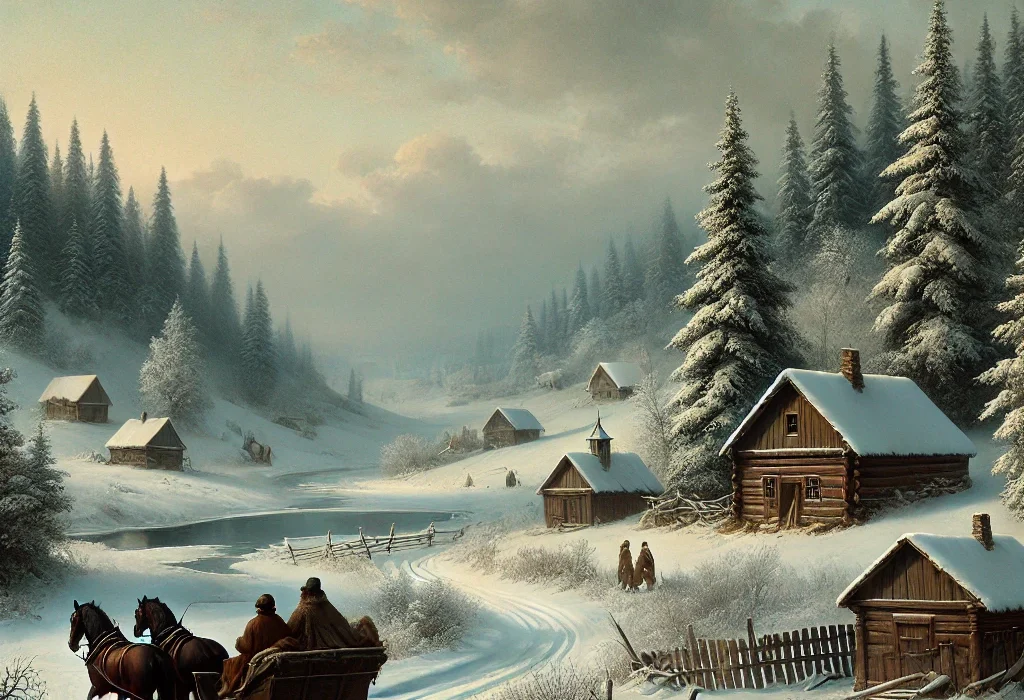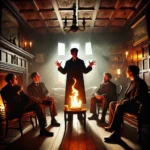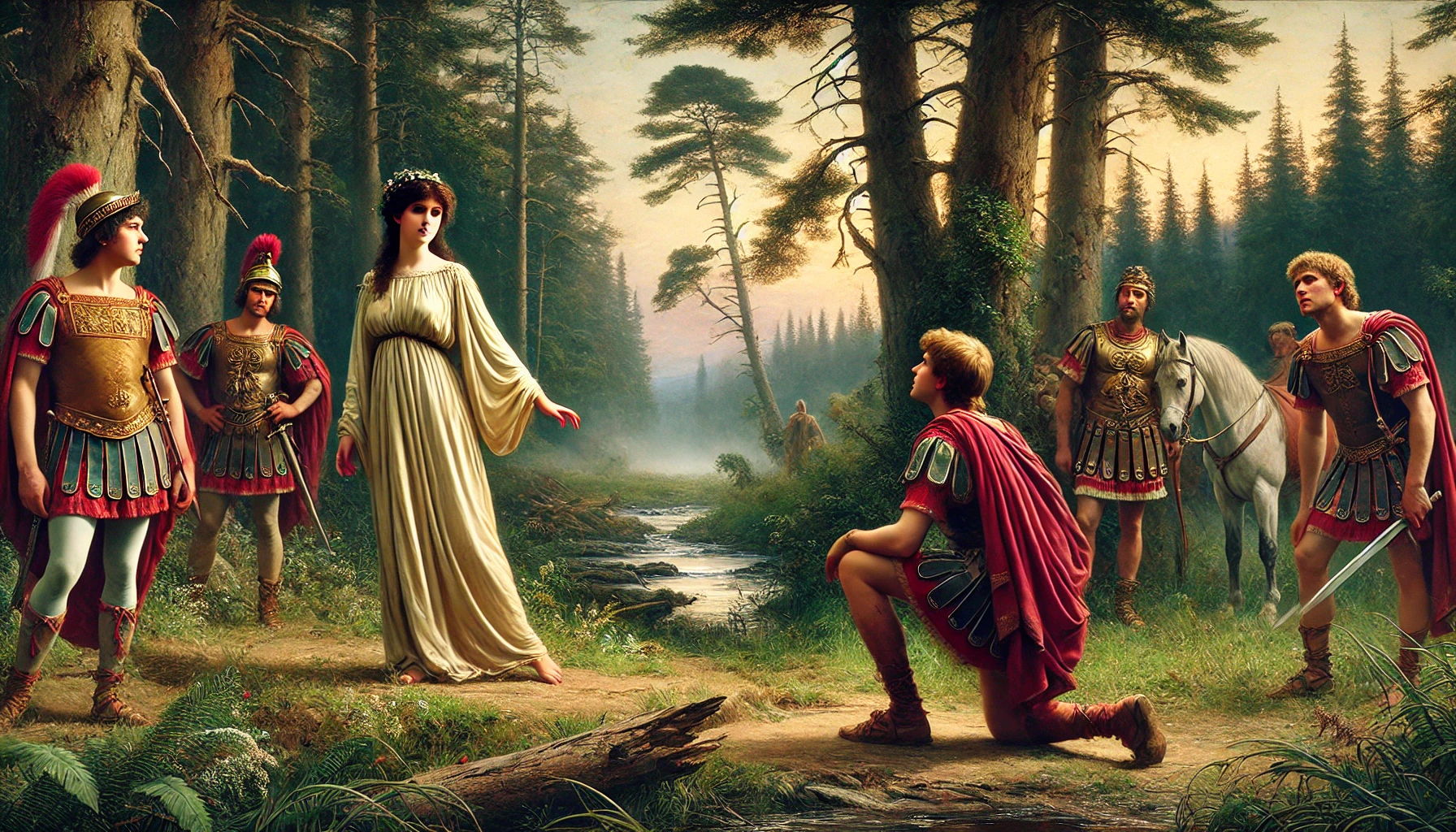“The Pioneers,” written by James Fenimore Cooper and published in 1823, is a seminal work in early American literature. Set in the late 18th century, it tells the story of the settlement and development of a frontier town, offering a vivid portrayal of the American wilderness and the clash between the natural environment and the encroaching forces of civilization. The novel is part of Cooper’s famous Leatherstocking Tales series, introducing readers to the complex dynamics of pioneer life and the interaction between settlers and the natural world.
Plot Summary
As the winter sun set over the rugged hills of New York, a sleigh wound its way along the treacherous path that led to the bustling village of Templeton. Judge Marmaduke Temple, a prominent figure in the town, was returning home after an extended absence, accompanied by his daughter, Elizabeth. The landscape before them was blanketed in snow, a serene and pristine canvas that concealed the profound changes taking place in the valley below. This was a land on the brink of transformation, caught between the untamed wilderness and the steady advance of civilization.
As the sleigh descended into the valley, Elizabeth gazed in awe at the village that had sprung up since her departure. The once wild terrain was now dotted with buildings, smoke rising from chimneys as the settlers busied themselves with preparations for the approaching Christmas festivities. Among the crowd was Natty Bumppo, known as Leather-Stocking, a seasoned frontiersman who roamed the forests with his faithful dogs, Hector and the slut. Natty was a man out of his time, a relic of a vanishing world, and a stark contrast to the orderly community that had grown around him.
In the heart of Templeton, Judge Temple presided over the affairs of the village with a firm yet fair hand. He had laid the foundations for the town’s prosperity, overseeing the construction of roads, mills, and houses. However, his efforts to bring order to the wilderness were not without conflict. The settlers’ encroachment on the land brought them into direct opposition with Natty Bumppo and others who viewed the forests as sacred and the game within them as a shared resource.
One such clash occurs when Judge Temple and Elizabeth encounter Natty and his young companion, Oliver Edwards, in the woods. They are startled by the sound of a rifle shot, only to find a wounded deer on the ground. Judge Temple had missed his mark, but Natty and Oliver had not. A dispute over the rightful ownership of the kill ensues, with Natty arguing for the rights of those who live by the forest’s natural law, while the Judge asserts the authority of civil law. This encounter sets the stage for the simmering tensions between the forces of nature and the forces of order, personified by Natty and the Judge.
Oliver Edwards, the enigmatic young man with a hidden past, becomes a frequent visitor at the Temple mansion. Elizabeth is drawn to his mysterious demeanor and deep connection to Natty Bumppo and the wilderness. As the days pass, she becomes increasingly captivated by his stories of the forest and the unspoiled land that once surrounded Templeton. Yet, Oliver is reticent about his past, keeping his true identity concealed even as he grows closer to Elizabeth.
The winter passes, and the harsh cold gives way to the thaw of spring, bringing with it new life and new conflicts. The settlers’ expansion into the wilderness accelerates, leading to the felling of trees and the clearing of land for agriculture. Natty watches these changes with a mixture of sorrow and anger, lamenting the loss of the forest and the freedom it represents. He clashes with the settlers, and particularly with Judge Temple, over issues such as hunting rights and the use of natural resources. To Natty, the forest is a sacred space, a place where man lives in harmony with nature, while to the settlers, it is a resource to be tamed and utilized for the growth of the community.
Amid these tensions, the town prepares for a grand celebration in honor of the Fourth of July. It is a moment of unity and festivity, yet it also underscores the divisions within the community. During the celebrations, Oliver Edwards’ true identity is inadvertently revealed. He is not merely a wanderer but the grandson of Major Effingham, the original landowner from whom Judge Temple had purchased the land. This revelation shocks the community and complicates the relationships between the characters. The land that Judge Temple and others have settled upon, that they have built their lives upon, is tied to a past that is more complex and intertwined than they had realized.
The tension reaches its peak when Natty is accused of poaching on Judge Temple’s land, a crime that the old frontiersman vehemently denies. A trial ensues, pitting the wilderness against the courtroom, and Natty stands before Judge Temple, defending not just his actions but his very way of life. The trial becomes a spectacle, a confrontation between the old ways and the new, and the community is forced to reckon with its own values and the costs of progress.
In a surprising turn, Oliver Edwards steps forward to defend Natty, revealing his own lineage and laying claim to the land that is now in Judge Temple’s hands. The revelation stuns the town and places the Judge in a moral quandary. Oliver’s assertion of his birthright challenges the very foundation of the settlement and forces Judge Temple to confront the implications of his own actions. Despite his newfound knowledge, Oliver does not seek to disrupt the lives of those who have settled on the land. Instead, he aims to protect Natty and the ideals he represents.
In the end, Judge Temple, torn between his sense of justice and his duty to uphold the law, chooses a path of leniency. He recognizes the value of Natty’s life and the significance of the wilderness that is slowly being eroded by the march of civilization. Natty is allowed to go free, but he chooses to leave Templeton, retreating deeper into the forest that is his true home. His departure is a poignant reminder of the passing of an era, as the wilderness makes way for the advance of society and the inevitable changes that come with it.
Oliver, with his lineage and newfound connection to Elizabeth, decides to stay and contribute to the growing community. He becomes a symbol of reconciliation between the old and the new, carrying forward the legacy of the land while embracing the future. As he and Elizabeth look out over the valley, they see a world in transition, a world that must find a balance between the demands of progress and the preservation of its natural heritage.
“The Pioneers” thus ends on a note of bittersweet reflection, capturing the complexities of a changing world where the drive for progress often comes into conflict with the need to honor and protect the natural world. It is a tale of the American frontier, a story of growth and loss, of individuals caught in the tide of history, striving to forge their paths in a land that is both a promise and a paradox.
Main Characters
Natty Bumppo (Leather-Stocking): An experienced frontiersman, Natty is a symbol of the wilderness itself. He lives by a personal code of honor and a deep respect for nature. As one of the last representatives of a vanishing way of life, his character embodies the tension between the natural world and the advancing tide of civilization.
Judge Marmaduke Temple: A prominent figure in the developing settlement of Templeton, Judge Temple represents the law and order of the new American society. He is a fair and just leader, striving to balance progress with the preservation of the land and its resources.
Elizabeth Temple: The daughter of Judge Temple, Elizabeth returns to the settlement after being educated in the city. She is curious and intelligent, embodying the bridge between the old world of nature and the new world of progress and culture.
Oliver Edwards (Edward Effingham): A mysterious young man who has a deep connection with Natty Bumppo and the wilderness. As the story unfolds, his true identity and background become a pivotal part of the narrative, adding layers of intrigue and complexity to the plot.
Theme
Nature vs. Civilization: A central theme in “The Pioneers” is the conflict between the untouched wilderness and the advancing forces of civilization. Cooper explores the impact of human development on the natural environment, portraying the beauty and harshness of nature alongside the encroaching settlements that bring both progress and destruction.
Law and Justice: Through the character of Judge Temple, the novel examines the establishment of law and order in a new society. The tension between traditional, natural justice as represented by Natty and the formal legal system of the settlers raises questions about the nature of justice and the complexities of imposing human laws on the natural world.
Tradition vs. Change: The story captures the inevitable changes that come with progress, highlighting the clash between the old ways of life and the new. Natty Bumppo symbolizes the disappearing frontier spirit, while Judge Temple and the settlers represent the march of progress and modernization, leading to a nuanced portrayal of America’s growth.
Writing Style and Tone
James Fenimore Cooper’s writing in “The Pioneers” is characterized by detailed descriptions and a deep reverence for the natural world. His language is rich and often poetic, painting vivid pictures of the American wilderness and the daily lives of the settlers. The narrative is imbued with a sense of nostalgia for the passing of a simpler, more rugged way of life, as well as a keen awareness of the complexities of progress and civilization.
The tone of the novel is contemplative and, at times, melancholic. Cooper uses the characters and setting to reflect on the broader themes of change and the human impact on nature. His portrayal of the tension between the wilderness and the encroaching civilization is nuanced, capturing both the promise and the loss that come with the development of the American frontier. Through this tone, Cooper invites readers to consider the cost of progress and the value of preserving the natural world.
We hope this summary has sparked your interest and would appreciate you following Celsius 233 on social media:
There’s a treasure trove of other fascinating book summaries waiting for you. Check out our collection of stories that inspire, thrill, and provoke thought, just like this one by checking out the Book Shelf or the Library
Remember, while our summaries capture the essence, they can never replace the full experience of reading the book. If this summary intrigued you, consider diving into the complete story – buy the book and immerse yourself in the author’s original work.
If you want to request a book summary, click here.
When Saurabh is not working/watching football/reading books/traveling, you can reach him via Twitter/X, LinkedIn, or Threads
Restart reading!








